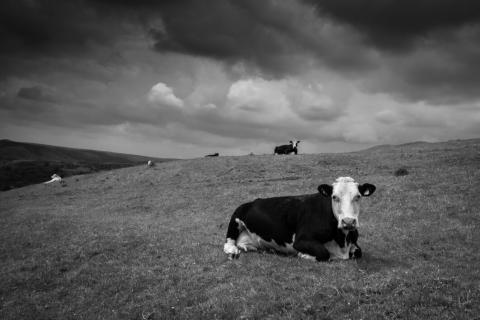
I think an important dimension of debates about the future of livestock farming, and farming more widely, is what give people’s lives meaning, purpose and joy. I wrote previously about how grazing was seen in Ireland and the UK in terms of economics, environmental sustainability and animal welfare. When I interviewed farmers in the UK and Ireland, an important additional element that came out was that farmers who grazed enjoyed grazing. A farmer in England said:
“I like the countryside. I like the noise, from the birds. I like the growth. I like the cows going out, that’s the number one thing.”
Here, appreciation of the natural life on his farm is bound up with the experience of the cows grazing. Another farmers said:
“I’d be really, really disappointed if we, if our cows were in all the time, because i like having them outside. I just like that part of it, you know, to get out there in the field with them, and, especially you can’t beat a nice sunny day, going and getting the cows in.”
This experience was reiterated by many, many people I interviewed who grazed. (Views weren’t homogenous of course. for some grazing was a hassle and not worth the effort. And when they moved production indoors they were convinced neither they nor the cows missed going outside.)
It could be easy to sentimentalise or trivialise the positives of being outside in the field with cows on a sunny day. Emotions and experience have long been the poor relation to the rationality and objectivity of economics or science. But I would argue this experience is important and should be factored into decision making about the future of livestock farming. How we live and what we value matters.
In the UK there are economic, animal welfare and environmental arguments made for different kinds of dairy systems, from low input grazing, to intensive, high-input systems. And discussions about what form livestock farming should take are within the shadow of bigger, existential arguments that livestock farming should be drastically reduced to tackle greenhouse gas emissions and other environmental problems.
Change is needed. (I think we do need to reduce cow numbers and produce and consume less meat and dairy. Not because cows or farmers are uniquely guilty, but because the climate crisis is so huge reductions and change are necessary across pretty much all sectors of modern existence.)
But I would hate to see policy and industry decisions made based on a certain interpretation of the numbers that favours input and scale-based ‘sustainable intensification’. I.e. a future where we all consume a lot fewer meat and dairy products, with the remaining production happening in a few, large, tightly controlled units. This would involve losing some interconnectedness between cows, people, their environment and society.
From my interviews I also understood that grazing is difficult: the climate is changing which can make putting cows outside a challenge. And not all grazing is created equally from an environmental point of view: You can have intensive grazing and regenerative grazing and many variations in between with widely different environmental impacts. so work, advise, infrastructure and support are needed for sustainable grazing to happen.
What I’m arguing is that language of emotions, experience, meaning has a place alongside economics, sustainability assessment and kpis in on-farm and sector wide decision making. For the public, for animals and for farmers.